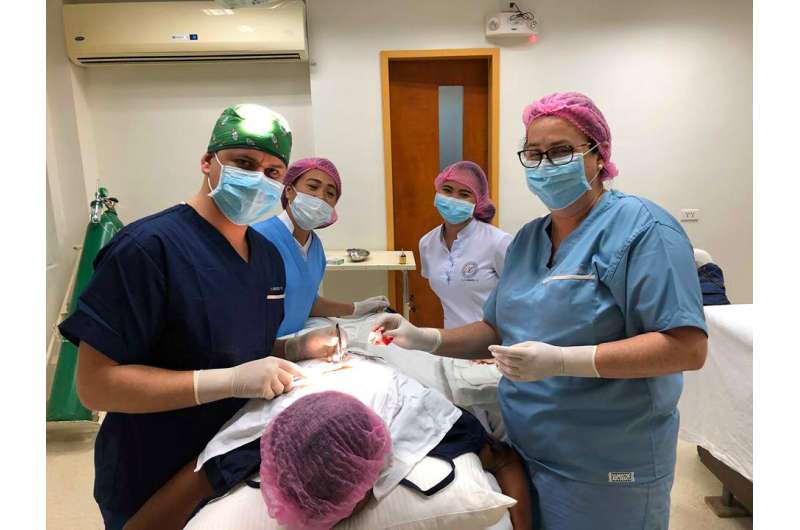Researchers use an app to decrease infections following surgery

Volunteer surgeons and students take part every year in medical-surgical mission Medipinas, to perform free operations for patients with no resources in the Santa Maria Josefa Hospital Foundation of Iriga City, in the Philippines. In order to improve the monitoring of operations and to prevent infections in the surgical wounds of these patients, the Medipinas team has used an app and designed a protocol to educate patients on how to treat the surgical wound. The results of this successful experience, led by CEU UCH Medicine professor Belén Merck, have been published in medical journal Cirugía Española, the scientific publication of the Spanish Surgeon Association, edited by the Elsevier group.
According to doctor and professor of the Department of Medicine and Surgery of the CEU UCH, Belén Merck, “three years ago we detected that 25 of the 87 patients who we operated on in the Medipinas mission developed an infection in the surgical wound. This is a high rate compared to the average 11% published by the WHO for countries with low and medium income. The infection prevention and surgical material sterilization protocols of the hospital had been correct, which is why we found that one of the factors involved in the unusual rate of infection is the lack of knowledge of the population on how to correctly treat the wound, as well as the lack of basic material to do so and clean water. This led us to design a new monitoring and prevention protocol for Medipinas2019, with which we managed to decrease these infections by almost 20 points, from 28.8% to 9.7%. We published these results inCirugía Española, so that our preventive method can be used in other medical missions in third countries.”
The Medipinas2019 surgical mission was added to the “Zero Surgical Infection Decalogue” (infeccionquirurgicazero.es/es/) for participating volunteer surgeons and students, with the adaptations needed to work at a hospital with limited resources. This decalogue focuses on increasing hand washing, using 2% alcohol chlorhexidine to prepare the surgical field and controlling blood sugar in diabetic patients, as well as instructions on ideal antibiotic prophylaxis. “Furthermore, to educate patients, we produced a document that we give them after the surgery. It explains, in a very simple way, the treatments for surgical wounds and signs that warn of infection. We also give them material to treat the wound,” explains Belén Merck.
Monitoring with an app
Another key element in the decrease in infections achieved at Medipinas2019 was the remote monitoring and evolutionary control of the surgical wound, by adapting a computer application (Numbers, by Apple), which made it possible to gather all the clinical data of each patient. The addition of a color code on the end condition of the wound noted by Philippine nurses, also facilitated remote monitoring and treatment of all cases.
“The use of apps for surgery and cooperation is not a novelty, but the app used for Medipinas, with the approval of the Ethics Committee of the Health Sciences Faculty of the CEU UCH, stands out for having been created for a specific project and with minimal costs and developmental complexity,” says Dr. Belén Merck.
Five years of medical volunteerism
According to professor Merck, “it is customary in these rural areas with limited resources when there is a medical issue to ask a healer, because it is more affordable than going to a doctor or the chemist. The staff who takes part in volunteering projects in other countries has to be respectful of local traditions, but must also provide the relevant education. Focusing on hand hygiene, cleaning the wound and providing material to treat the wound, which a majority would not be able to purchase, was essential to decrease the rate of infection to less than 11%, which was the goal set in Medipinas, as well as improving the remote collaboration with our colleagues, with an app which is easy to use.”
Source: Read Full Article


